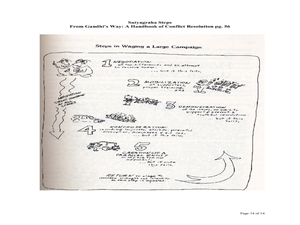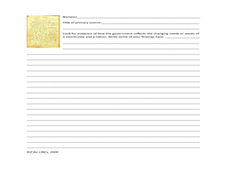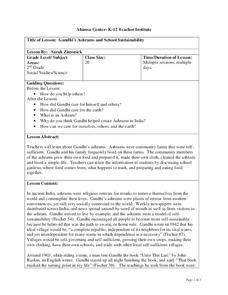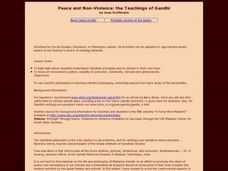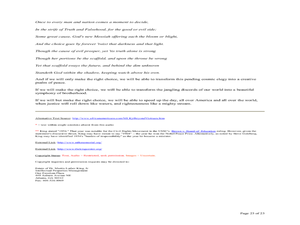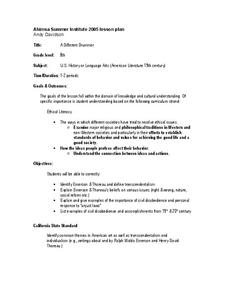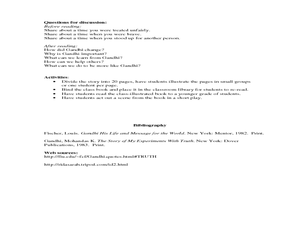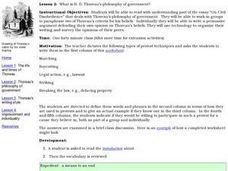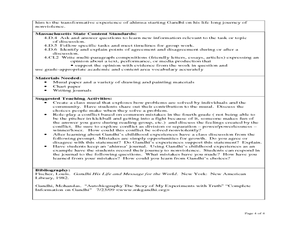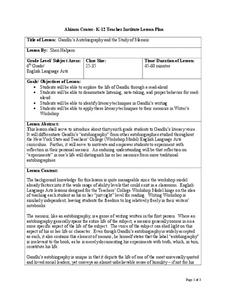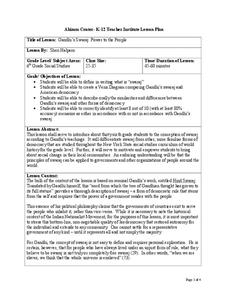Curated OER
Gandhi Speech Writing
Explore non-violent protest in this social values and world history lesson. After viewing the movie Gandhi, and discussing important events in Gandhi's life, young orators write a speech defending Gandhi's position on the value of...
Curated OER
Applying Ahimsa to Traditional Stories
Investigate the life of Mahatma Gandhi by researching non-violent lifestyles. Learners define the word ahimsa and discuss the personal characteristics that made Gandhi a peaceful warrior. They also create a poster about the story "The...
Curated OER
Gandhi's Voice: Writing as Nonviolent Resistance
Ninth graders identify how Mahatma Gandhi used writing as a means of nonviolent communication. In this nonviolent resistance lesson, 9th graders watch a film about Gandhi as a writer and identify characteristics of nonviolent activism....
Curated OER
Gandhi's Non-violent Revolutions: Examining Tools to Make Non-violent
Learners analyze Gandhi's philosophy of nonviolent social change. In this nonviolence and social change lesson, students research a leader from the attached list who practiced nonviolent social change. Learners write their own poem...
Curated OER
Nonviolent Protest Around the World
Twelfth graders complete research that exposes them to examples of nonviolent protest throughout the modern world. For this nonviolent protest research lesson, 12th graders discover information about signification nonviolent movements...
Curated OER
Selfless Service and The Giving Tree - Building Ethical Conscience
Upper elementary schoolers investigate philanthropy and selflessness by reading a children's book. In this ethics lesson plan, they read The Giving Tree by Shel Silverstein, and research Mahatma Gandhi's troublesome, yet inspiring, life....
Curated OER
A Comparison of Two Great Leaders: Mahatma Gandhi and Martin Luther King Jr.
Students explore these two leaders use of nonviolent protest techniques. They read about the life of King Jr. They view a slide show about the life of Gandhi. Compare/contrast the lives of these two men using a Venn diagram.
Curated OER
Towards Separation of Church and State in Gloucester
Explore New England government in the 1700's with your class. They will identify historical documents as primary or secondary sources, then read and discuss the significance of these documents as they relate to the "freedom of religion"...
Curated OER
Gandhi's Ashrams and School Sustainability
Explore philosophy and religion by researching Gandhi. Lead your young students to investigate the life and accomplishments of Mahatma Gandhi by reading the assigned text. Your class will define sustainability and create a sustainable...
Curated OER
An Introduction to the Season for Nonviolence
Fourth graders create a Venn diagram and a cause and effect graphic organizer on Gandhi and King. In this non violence lesson plan, 4th graders compare the two non violent leaders and discuss and articulate non violent protests and write...
Curated OER
Peace and Non-Violence: the Teachings of Gandhi
Students study the Gandhian philosophy. They define certain elements such as power, beauty and discuss what they know about the struggle for independence in India. Finally students collaborate to discuss Gandhian principles to extend...
Curated OER
Muhammad Ali and his Vietnam War Resistance: Defining Nonviolent Action through Gandhi and King
Students research Muhammad Ali's act of civil disobedience. In this civil disobedience lesson plan, students research Ali's defiance of the Vietnam War draft and compare his reasoning to Martin Luther King's thoughts on the war. Students...
Curated OER
A Different Drummer
Eighth graders investigate philosophy and meditation techniques by discussing Emerson and Thoreau. In this philosophical traditions lesson, 8th graders identify the men Ralph Waldo Emerson and Henry David Thoreau, their work, and their...
Curated OER
Nonviolence as a Tool for Change Lesson 1
Students examine voting rights in the South during the 1950s and 1960s. In this civil rights lesson, students examine legal rights and the opportunity to cast votes. Students research primary documents regarding the topic and share their...
Curated OER
Mohandas Gandhi: Changing the World One Step at a Time
Learners illustrate pages of a book. In this famous historical icon lesson, students are read a story about Mohandas Gandhi, illustrate the pages in small groups, assemble a class book to read to younger learners, and act out a scene...
Curated OER
H.D. Thoreau's Philosophy of Government
Students read an essay by H.D. Thoreau as analysis of his philosophy on government. In this Thoreau analysis lesson, students work in groups to paraphrase two of Thoreau's criteria for his beliefs about government. Students write a...
Curated OER
The Way You Dream: Gandhi and King's Visions of Nonviolence
Students read Gandhi and Dr. King's messages about nonviolence and discuss their visions about loving one's enemies. In this nonviolence instructional activity, students read Gandhi's "Ahimsa, or the Way of Nonviolence" and Dr. Martin...
Curated OER
Tracing the Idea of Civil Disobedience through Thoreau, Gandhi, and King
Students analyze civil disobedience through history studying Thoreau, Gandhi, and Dr. King. In this civil disobedience lesson, students read and analyze excerpts from Thoreau, Gandhi, and Martin Luther King. Students demonstrate their...
Curated OER
Ahimsa in Writers Workshop
Students investigate nonviolent lifestyles by researching the life of Gandhi. In this journalism lesson, students define the word ahimsa and how important nonviolence is when solving conflicts. Students create a timeline of personal...
Curated OER
Gandhi's Childhood Experience of Truth and Nonviolence
Fourth graders investigate philosophy by researching the life of Mahatma Gandhi. In this historical biography instructional activity, 4th graders examine the peaceful philosophy of India's most famous resident. Students participate in...
Curated OER
Understanding the Theoretical Basis for Civil Disobedience
Students analyze Henry David Thoreau's 'On the Duty of Civil Disobedience' and Dr. Martin Luther King's "Letter from Birmingham Jail." In this civil disobedience lesson, students read Thoreau's essay and answer 6 questions for the...
Curated OER
Chiune Sugihara, Living by Gandhian Principles
Seventh graders read about Chiune Sugihara and analyze the moral situations he faced. In this morality lesson, 7th graders read chapters from A Special Fate, Chiune Sugihara: Hero of the Holocaust and analyze his moral decisions in the...
Curated OER
Gandhi's Autobiography and the Study of Memoir
Seventh graders explore the life of Gandhi using his autobiography and memoir. In this Gandhi exploration lesson, 7th graders analyze Gandhi's literary voice by reading his autobiography. Students identify literary techniques in Gandhi's...
Curated OER
Gandhi's Swaraj: Power to the People
Sixth graders discover what a swaraj is. In this world history lesson, 6th graders create a Venn Diagram comparing Gandhi's swaraj to American's democracy.





